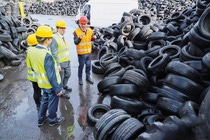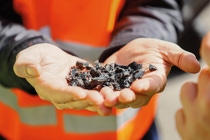Media
BASF signs agreements with New Energy for uptake of pyrolysis oil derived from waste tires and for a joint feasibility study
- Supply of pyrolysis oil from end-of-life tires an important step in the commercialization of BASF’s ChemCyclingTM project
- Pyrolysis oil from end-of-life tires as an additional raw material source next to oil from mixed plastic waste
- Partners will conduct a joint feasibility study that targets the adaption of New Energy’s proprietary pyrolysis technology to the conversion of other plastic waste streams
Ludwigshafen, Germany and Budapest, Hungary – September 1, 2020 – BASF SE (“BASF”) signed an uptake supply agreement with New Energy, a technology company specialized in the pyrolysis of waste tires, headquartered in Budapest, Hungary. According to the agreement, New Energy will supply BASF with up to 4,000 metric tons of pyrolysis oil per year derived from waste tires. In a pilot phase, first volumes of the pyrolysis oil have already been utilized successfully in BASF’s integrated chemical production site (Verbund) in Ludwigshafen, Germany.
The agreement is part of BASF’s ChemCyclingTM project which was started in 2018 and focusses on chemically reprocessing post-consumer plastic waste on an industrial scale. Since 2020, first commercial products are in the market.
The focus of the project remains the use of mixed plastic waste, which would otherwise end up in landfill or incineration. In addition, BASF also sees an opportunity to increase recycling rates for end-of-life tires. “So far, there was no technology that allowed the recycling of pyrolysis oil from tires into high value applications. By further broadening our raw material base to waste tires, we can create a new circular value stream. Moreover, we establish a second recycled feedstock in our ChemCycling project with which we can manufacture high-performance products for our customers’ demanding applications”, said Dr. Christian Lach, Project Leader ChemCycling at BASF. Waste tires fall within the definition of post-consumer plastic waste according to DIN EN ISO 14021:2016-07.
BASF and New Energy are both committed to work on solutions for the global plastic waste problem. The two parties have therefore additionally signed an agreement for a feasibility study that targets the adaption of New Energy’s proprietary pyrolysis technology to the conversion of other plastic waste streams.
“The collaboration with New Energy underlines BASF’s ambition to use recycled raw materials in the chemical industry and lead the transition to a circular economy for plastics,” said Lach. “Partnerships with agile, innovative companies are key to achieving these ambitions. We are happy that we have found such a partner in New Energy, in addition to our partnership with Quantafuel that will soon supply us with pyrolysis oil derived from mixed plastic waste from their commercial scale plant in Skive, Denmark.”
Viktor Varadi, CEO of New Energy, added: “We are proud that our technology provides value to BASF, and through this collaboration to their customers. We spent almost a decade to develop and optimize our technology and are now successfully operating an industrial-scale plant which turns waste tires into secondary raw materials. This puts us at the forefront when it comes to establishing a circular economy for tires. Our objective is to achieve quantifiable environmental benefit. The reduced need for primary fossil resources clearly serves this objective as well as the reduced carbon footprint of the newly manufactured products.”
BASF feeds the pyrolysis oil supplied by New Energy into its integrated Verbund site in Ludwigshafen, thereby replacing fossil resources. The share of recycled raw material is allocated to certain products manufactured in the Verbund by using a third-party audited mass balance approach. The products which carry the name suffix “CcycledTM” have the exact same properties as those manufactured from fossil feedstock. Customers can therefore further process them in the same way as conventionally manufactured products and use them in applications with high demands regarding quality and performance, such as automotive parts.
About BASF
At BASF, we create chemistry for a sustainable future. We combine economic success with environmental protection and social responsibility. More than 117,000 employees in the BASF Group work on contributing to the success of our customers in nearly all sectors and almost every country in the world. Our portfolio is organized into six segments: Chemicals, Materials, Industrial Solutions, Surface Technologies, Nutrition & Care and Agricultural Solutions. BASF generated sales of €59 billion in 2019. BASF shares are traded on the stock exchange in Frankfurt (BAS) and as American Depositary Receipts (BASFY) in the U.S. Further information at www.basf.com.
About New Energy
New Energy is an innovative technology company specialized in the development and commercialization of solutions related to circular economy. New Energy’s main mission is to turn formerly untreatable polymer based and organic waste streams into useful raw materials for the petrochemical industry, thus addressing the unsustainable extraction of natural resources in an economically viable manner. The company has developed and commercialized a proprietary technology that can turn waste tires back to secondary raw materials to support circular economy strategies of its partners and customer and has over a decade of operational experience in running a pyrolysis plant. The strategic business development of New Energy was managed by DBH Investment (www.dbh-group.com). Further information about New Energy at www.newenergy.hu.
Media contacts:
|
BASF Global Communications Petrochemicals |
New Energy |
| Claudia Neumair | Viktor Varadi |
| Phone: +49 621 60-59958 | Phone: +36 (1) 283 74 61 |
|
Email: claudia.neumair@basf.com
|
Email: office@newenergy.hu
|



